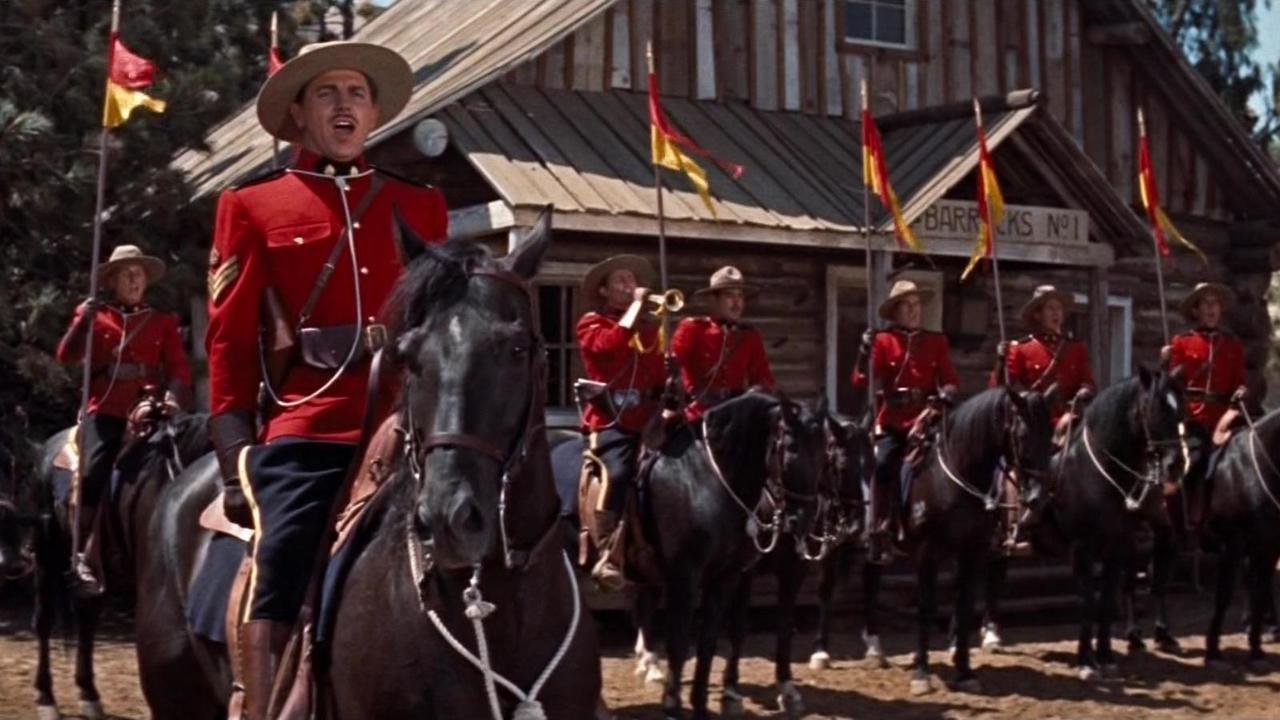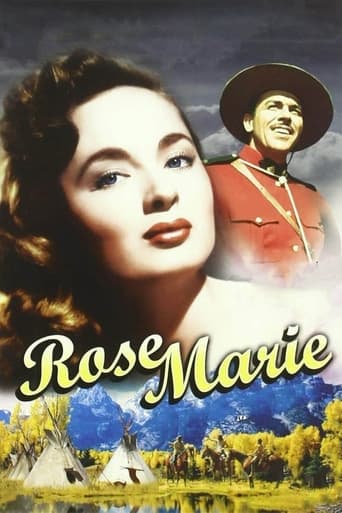

n my opinion it was a great movie with some interesting elements, even though having some plot holes and the ending probably was just too messy and crammed together, but still fun to watch and not your casual movie that is similar to all other ones.
... View MoreEach character in this movie — down to the smallest one — is an individual rather than a type, prone to spontaneous changes of mood and sometimes amusing outbursts of pettiness or ill humor.
... View MoreJust intense enough to provide a much-needed diversion, just lightweight enough to make you forget about it soon after it’s over. It’s not exactly “good,” per se, but it does what it sets out to do in terms of putting us on edge, which makes it … successful?
... View MoreThe story, direction, characters, and writing/dialogue is akin to taking a tranquilizer shot to the neck, but everything else was so well done.
... View MoreVery different from the '36 Jeanette MacDonald-Nelson Eddy version. The screenplay more resembles the plot details of the 1924 play. However, it thankfully simplifies the excessively complicated romantic relationships of the play. The '36 version further simplified the romantic entanglements, with Eddy having no legitimate competition for Jeanette's heart. That's the way Eddy liked his films with Jeanette. Here, Howard Keel's and Fernando Lamas' characters compete for Rose Marie's(Ann Blythe) heart, although clearly she thinks of Keel's Mountie character as more of a father figure. Keel sings the classic Friml-Harbach-Hammerstein songs "The Mounties" and 'Rose Marie". Ann initiates the classic "Indian Love Call" on several occasions, with Lamas responding.Blythe's frontierswoman persona will remind you of the character of Anne, in "Anne get Your Gun", and Calamity Jane, in the film of the same name, released just the year before. Keel was the male lead in both of those films, in which the woman eventually is 'civilized' sufficiently to become an acceptable mate for him. In this film, the same transformation is attempted. but, in the end, Keel realizes that Rose Marie, in her current state of mind, wouldn't be happy as a mountie's settled wife. She prefers to wander in the wilderness, as expressed in the new song by Frimi and Webster "Free to Be Free". Thus, he eventually facilities her reunion with wandering trapper, of dubious reputation: Jim Duval(Lamas), whose life he had recently spared, when he was wrongly sentenced to death for the murder of an Indian chief. In contrast, in the '36 film, the Mountie played by Eddy captures Marie's cherished brother, who had escaped from prison, and who presumably will be sentenced to death for a murder committed during that escape. Regardless, Marie's love for Eddy's character is not extinguished: a rather awkward response. Superficially, the characterization of Rose Marie here couldn't be more different from the '36 version, where she has been a city-confined prima dona of the opera stage. However, they have the feminist commonality of initially feeling that they don't need a man and children to feel fulfilled.Margie Main: the hotel proprietor, and Bert Lahr, as an aging Mountie, are included as would be comic reliefs. Lahr does get to do a humorous take on Keel's "Mounties", with "I'm a Mounty Who Never Got his Man", in his inimical style. Unfortunately, their main interaction together was deleted, although it's included as an extra on the current DVD release. Keel seems unusually wooden, especially in his speech, in this film, compared to his other films I've seen: a charge often leveled(unjustifiably, in my opinion) at Nelson Eddy. Perhaps because he isn't the romantic lead? This, along with his monotone speaking is the chief distraction I find with this film. Ann is fine as Rose Marie, and Lamas as her new found 'bad boy' love, with a similar wanderlust.In the play, Black Eagle is Wanda's lover, not tribal chief, and she kills him to protect another of her lovers, not included in this film, from his wrath. In the '36 film version, her role is minimal. However, in the present version, she kills Black Eagle as revenge for a beating by him for her dalliance with Duval. However, having seen Duval together with Rose Marie, as observers of the Totem Pole Dance, she remains quiet when Duval is blamed for the murder, partially as revenge for his abandonment of her for Rose Marie.The Totem Pole Dance, staged by Busby Berkeley, utilizes a new song, rather than the original, as in the '36 version. It is a much more modern stylized dance than in the '36 film. Wanda is the lone female, surrounded by a bevy of men, who cavort with her. It comes across as a sort of fertility dance. Joan Taylor, who played Wanda, was most frequently cast in westerns, including some TV series.Incidentally, sensible frontiersmen didn't wear coonskin caps in the warm season. They were too hot! That was just a standard Hollywood detail to denote a backwoods frontiersman(or woman, in this case).Now that both this film and the '36 version are currently available for purchase on DVD, we can easily compare them. To me, both have their merits and minuses. However, I suspect the younger generation will clearly favor this version, for its CinemaScope filming and more modern screenplay and acting. However, I find the singing more fervent in the '36 film. Also, I generally prefer the acting of Jeanette and Eddy over that of Ann and Keel. I also prefer "Anne Get Your Gun" and "Calamity Jane" over this film.
... View MoreMGM's first CinemaScope musical is pictorially splendid, with what looks like on-location shooting of the Canadian wilderness, or a very good faking thereof. The lake and mountain vistas must have been spectacular on the big screen; even on a TV screen they're impressive. Also, the screenwriters dump the pretensions that marred the 1936 Nelson-Jeannette version and return closer to the 1924 stage story, streamlining it nicely and removing some of the clunkiness in the dialog. Only a handful of the original Friml-Harbach-Hammerstein-Stothart songs survive, but several of the new ones are by Friml, too (with lyrics by Paul Francis Webster), and one, "I Have the Love," is quite nice. Ann Blyth, while not credibly a backwoods French-Canadian, is lovely and with a fine set of soprano pipes, and Howard Keel reminds us again of how Hollywood underrated him--one of our most masculine musical leading men, with an easy understated acting style to back up his booming vocals. Fernando Lamas hasn't that much to do, and it feels unfair that one of Ms. Blyth's leading men has to be a good sport and just step back and let her love the other. And Bert Lahr may be a comic genius, but his and Marjorie Main's material is so rotten that you tend to forget it. Still, a couple of soundstage scenes aside, it's a gorgeous big-screen production, and not as dramatically inert as many other operetta-derived musicals. A very pleasant 107 minutes.
... View MoreIn this third film of Rose Marie and probably the last one we'll ever see, every single version of the film is different to each other and to the plot of the original Broadway show. Since operettas are a thing of the past I doubt another version would be made. Where would you get voices like Ann Blyth, Howard Keel and Fernando Lamas?This version has Ann Blyth as Rose Marie, a trapper's daughter now alone out in the woods. Though she's pretty capable of taking care of herself, those in authority don't see it that way. Mountie Howard Keel brings her into what passes for civilization in the Canadian west at the turn of the last century.Keel's seeing Ann in a whole different light when she puts on a dress, but trapper Fernando Lamas will take her any old way, so Ann's got to choose between them.The main songs from the 1936 version make it here, you couldn't really do Rose Marie without Indian Love Call, The Mountie Song or the title number. Rudolf Friml wrote some other nice songs for the original Broadway production which didn't make it into the classic Nelson Eddy/ Jeanette MacDonald version or this one.Friml contributed some new songs in what would turn out to be his next to last songwriting assignment and they're well suited for the voices that have to sing them. Otto Harbach and Oscar Hammerstein, II did the original lyrics for Broadway, but in this Paul Francis Webster collaborated with Friml and provided the words.For comic relief we have Marjorie Main and Bert Lahr, playing something along the lines of a cowardly Mountie. But actually he proves to be of invaluable help to Howard Keel.Keel in his memoirs was not originally satisfied with the Mountie part, feeling he was written like a Dudley DooRight idiot in the first draft. Some considerable rewriting was done before he went before the camera.He also tells of a practical joke that second unit director Howard Koch pulled on director Mervyn LeRoy by having Jack Benny show up in a Mountie uniform and mess up the takes of the Mountie Song. Benny and LeRoy were good friends and when LeRoy realized who it was, he broke up and shooting was done for the day.Busby Berkeley got some work in this film, staging the Totem Tom Tom number. There are words to the song, but you won't hear any in this or in the earlier one. Totem Tom Tom is nicely choreographed. I'm always amazed at how Rudolf Friml who studied under Anton Dvorak in Prague before coming to America was able to capture the American Indian rhythm with that song.This 1954 version of Rose Marie has enough merit to it that it does not suffer comparison with what Nelson and Jeanette did back in the day. Fans of operetta will like it, even devoted Eddy/Mac people.
... View MoreNot enough good things can be said about this beautiful musical, one of my favorites. It has the right combination of romance, conflict, suspense, tragedy, and comedy in the plot. The setting is in the colonial or exploration era of Canada, and the rivalry between English and French Canadians is evident.The story is about Rose Marie (Ann Blyth), a tomboyish girl that her guardian Mountie (Howard Keel) tries to civilize. Rose Marie is grateful to him, but she truly loves the French trader Duval (Fernando Lamas), who accepts her as she is. The unrequited love an Indian girl has for Duval adds to the conflict and leads to the tragic elements in the film. However, justice and a happy ending prevail.I commend Turner Broadcasting for keeping "Rose Marie" alive by showing it on the movie channel, but I would love to have a quality DVD version. I hope it will be on DVD soon.The film has inspired me to look for the sheet music and script from the musical, and I am very disappointed that I cannot find a "Rosemarie" songbook. If any music and script publishers are listening, they should have the score and script of this film in print.
... View More